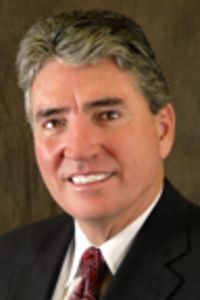David Clark (Utah state representative)
David Clark (b. July 3, 1953) is a former Republican member of the Utah House of Representatives. He served in that position from 2001 until his resignation, which became effective on January 5, 2012. While he gave no specific reason for resigning, he was reported to have been considering a run for U.S. Congress in 2012.[1]
Clark served as a State Delegate in 1996. He also served as a County Delegate in 1996, 1998, and 2000.
Clark has been the Regional President in Banking since 1976.
Clark attended both Pacific Coast School of Banking and the National Commercial Lenders Graduate School. He went on to receive his B.S. from Brigham Young University in 1976.
Committee assignments
2011-2012
In the 2011-2012 legislative session, Clark served on the following committees:
- Health and Human Services Committee, Utah House of Representatives
- Revenue and Taxation Committee, Utah House of Representatives
- Rules Committee, Utah House of Representatives
- Subcommittee on Social Services Appropriations, Chair
Elections
2010
On November 2, 2010, Clark won re-election to the Utah House of Representatives, District 74.[2]
| Utah House of Representatives, District 74 General Election (2010) | ||||
|---|---|---|---|---|
| Candidates | Votes | |||
| 11,129 | ||||
| Cyril H. Noble (D) | 2,381 | |||
| Philip O. Jensen (C) | 791 | |||
2008
On November 4, 2008, Clark won re-election to the Utah House of Representatives, District 74 defeating opponent Terence Moore (D).[3]
Clark raised $155,801 for his campaign while Moore raised $3,000.[4]
| Utah State House of Representatives, District 74 (2008) | ||||
|---|---|---|---|---|
| Candidates | Votes | |||
| 12,508 | ||||
| Terence Moore (D) | 5,215 | |||
Campaign finance summary
Ballotpedia currently provides campaign finance data for all federal- and state-level candidates from 2020 and later. We are continuously working to expand our data to include prior elections. That information will be published here as we acquire it. If you would like to help us provide this data, please consider donating to Ballotpedia.
2016 Republican National Convention
- See also: Republican National Convention, 2016
Clark was a district-level delegate to the 2016 Republican National Convention from Utah. All 40 delegates from Utah were bound by state party rules to support Ted Cruz at the convention.[5] Cruz suspended his campaign on May 3, 2016. At the time, he had approximately 546 bound delegates. For more on what happened to his delegates, see this page.
Delegate rules
Delegates from Utah to the Republican National Convention were elected at the Utah state GOP convention in April 2016. All Utah delegates were bound by the results of the state's caucus on the first ballot. If a candidate allocated delegates did not compete at the national convention, then his or her delegates were reallocated and bound to the remaining candidates.
Utah primary results
- See also: Presidential election in Utah, 2016
| Utah Republican Caucus, 2016 | ||||
|---|---|---|---|---|
| Candidate | Vote % | Votes | Delegates | |
|
|
69.2% | 122,567 | 40 | |
| John Kasich | 16.8% | 29,773 | 0 | |
| Donald Trump | 14% | 24,864 | 0 | |
| Totals | 177,204 | 40 | ||
| Source: The New York Times and CNN | ||||
Delegate allocation
Utah had 40 delegates at the 2016 Republican National Convention. Of this total, 12 were district-level delegates (three for each of the state's four congressional districts). District delegates were allocated proportionally; a candidate had to win at least 15 percent of the statewide caucus vote in order to be eligible to receive any district-level delegates. If a candidate received more than 50 percent of the statewide caucus vote, he or she received all of the state's district delegates.[6][7]
Of the remaining 28 delegates, 25 served at large. Utah's at-large delegates were allocated proportionally; a candidate had to win at least 15 percent of the statewide caucus vote in order to be eligible to receive any at-large delegates. If a candidate received more than 50 percent of the statewide vote, he or she won all of the state's at-large delegates. In addition, three national party leaders (identified on the chart below as RNC delegates) served as bound delegates to the Republican National Convention.[6][7]
Personal
Note: Please contact us if the personal information below requires an update.
Clark and his wife, Nan, have four children.
External links
- Legislative profile from Project Vote Smart
- Biography from Project Vote Smart
- Campaign Contributions: 2008, 2006, 2004, 2002, 2000
Footnotes
- ↑ "David Clark resigning from Utah House," deseretnews.com, December 19, 2011
- ↑ Utah House of Representatives election results
- ↑ 2008 Election Results, Utah House of Representatives
- ↑ 2008 Utah Election Fundraising, Candidates
- ↑ Utah GOP, "National/Alternate National Delegate & Elector Official Results," accessed May 6, 2016
- ↑ 6.0 6.1 Republican National Committee, "2016 Presidential Nominating Process," accessed October 6, 2015
- ↑ 7.0 7.1 CNN.com, "Republican National Convention roll call vote," accessed July 20, 2016
| Political offices | ||
|---|---|---|
| Preceded by ' |
Utah House of Representatives District 74 2001-2012 |
Succeeded by Lowry Snow (R) |




